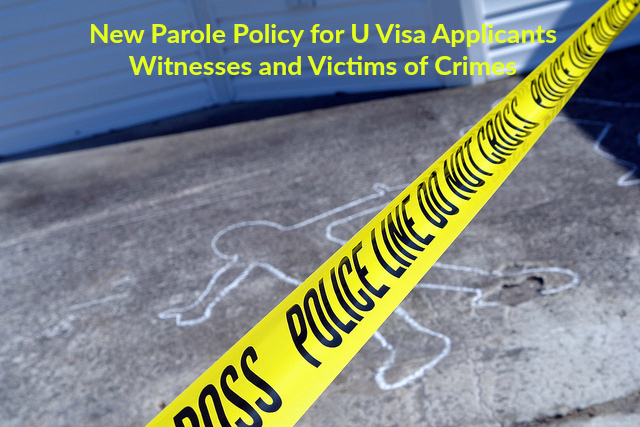We are pleased to announce that USCIS will adopt a new parole policy, at the recommendation of the Ombudsman’s office, for U visa principal petitioners and their derivative qualifying family members residing abroad, who are currently on waiting lists for the availability of U Visas. As a result of this new policy, eligible applicants will be able to seek parole into the United States and await availability of their U visas from the United States, instead of waiting from abroad.
The U visa was first implemented with the passage of the Victims of Trafficking and Violence Protection Act signed into law by Congress. This piece of legislation gave USCIS the authority to implement a special nonimmigrant visa classification known as the U visa. Presently, the U nonimmigrant visa is available to foreign nationals who have either been a witness to a crime in the United States, or who have suffered substantial mental or physical abuse as a victim of a crime that occurred in the United States. The U visa in effect creates a special class of nonimmigrants who may legally reside in the United States for the purpose of assisting law enforcement, or government officials, in ongoing investigations for the prosecution of certain crimes. Unfortunately, there is a congressional limitation on the number of U visa’s that may be issued to principal U visa applicants. That limit is currently capped at 10,000 visas on an annual basis.
Once the 10,000 visa cap has been exceeded, U visa nonimmigrants are forced to remain abroad, and are placed on a waiting list. In order to expedite their entry to the United States, applicants must go through the extra step of applying for humanitarian parole from abroad in order to enter the United States. Such victims are often in danger or in vulnerable situations in their home countries. Most importantly their key testimony and cooperation is of no use to the United States if they are residing abroad.
In the absence of a clear uniform U visa parole policy, the Ombudsman’s office called on DHS and USCIS to implement a parole policy to allow eligible U visa petitioners and their family members residing abroad, the opportunity to enter the United States, and await availability of their U visas within the United States instead of waiting for availability of a U visa from abroad.
The U.S. Department of Homeland Security responded recognizing that the cooperation of U visa applicants in ongoing investigations is of significant importance to the United States for the effective prosecution of crimes. Understandably, key witnesses and victims of crimes cannot effectively aid law enforcement and government officials from abroad. The United States thus has a clear interest in expediting their travel to the United States, in exchange for their cooperation and the benefits that cooperation would provide to law enforcements officials and the public at large.
In a separate memorandum, USCIS announced that they have taken the Ombudsman’s recommendations into consideration and will implement the new parole policy in Fiscal Year 2017. USCIS will create a new stand-alone application form for parole requests and will prepare policy guidance to be released some time in Fiscal Year 2017. USCIS will also be releasing a response to additional recommendations suggested by the Ombudsman’s office including 1. That the parole policy should allow concurrent filings of the U visa petitions and requests for parole and 2. That cases should be adjudicated at the Vermont Service Center (VSC), where U petitions are currently being processed to ensure efficient adjudication of parole requests.
We will notify our readers as soon as these recommendations have been considered.
For more information on the U nonimmigrant visa please visit our website.
For legal questions please contact our office.
 Visa Lawyer Blog
Visa Lawyer Blog


